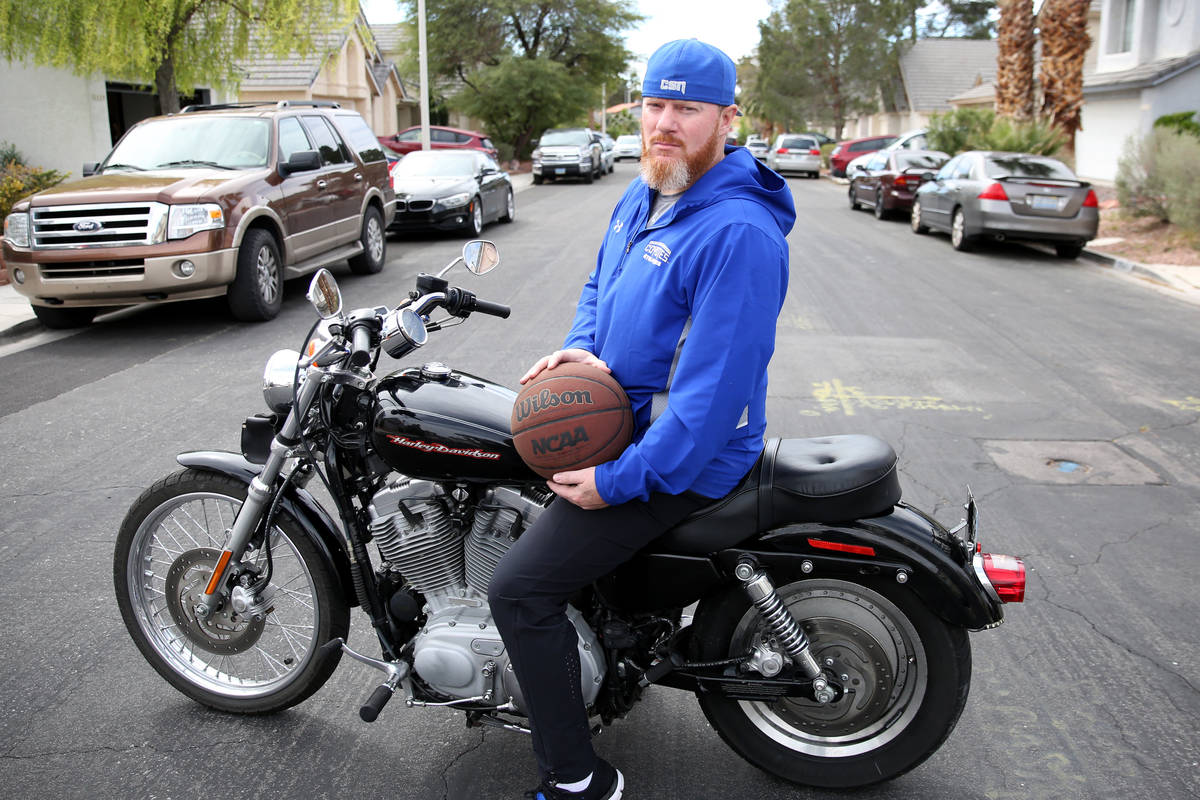
by Ron Kantowski from https://www.reviewjournal.com
There are advantages to coaching junior college basketball in a teeming metropolis, not the least of which is that one can recruit while riding a motorcycle.
Russ Beck, who recently was named coach of the College of Southern Nevada’s rebooted men’s basketball program, has signed 10 players. All are from Southern Nevada. All it has cost is a tank of gas.
“I’m probably the the only coach in America that can do his recruiting on the back of a Harley-Davidson,” Beck said.
Which he does.
His 2003 Sportster XL gets about 43.5 miles per gallon. It is 35 miles from CSN’s Henderson campus to Centennial High on the northwest edge of the Las Vegas Valley — probably as far as Beck will ever have to go to sign a 6-foot-4-inch power forward.
It may be more difficult finding a place to play than finding players.
There is no gymnasium on CSN’s Henderson campus, so the Coyotes will practice and play at CSN’s Cheyenne campus in North Las Vegas. Selected games might be played at UNLV’s Cox Pavilion or South Point Arena, if deals can be made.
“I’ve been at Western Nebraska in Scottsbluff, which is very rural, up in Twin Falls (Idaho), Cedar City and St. George (in Utah),” Beck, 41, said of coaching stops in basketball hinterlands. “(Here) I can see hundreds of players and do most of my recruiting within 45 minutes of the office.
“One of my selling points is you get to play in front of family and friends in a big city that is easy to get to for the Division I recruiters. All these coaches have been trained to come here because of the AAU (summer) tournaments. They know where to stay, where to eat, where the gyms are.
“Now they have another excuse to come out and watch basketball.”
Already on campus
Likewise, CSN didn’t have to go far to find its basketball coach. Beck was employed by the school as an athletic academic adviser. He had a relationship with CSN athletic director Dexter Irvin, who was AD at Dixie State in St. George when Beck was a basketball assistant there.
Beck also was an assistant at Salt Lake Community College and the College of Southern Idaho, teams he’ll now have to beat in the Scenic West Athletic Conference. He spent seven years as head coach at Western Nebraska CC, winning 124 games and helping the Cougars attain a national ranking.
Junior college teams have a reputation for playing firewagon basketball with an emphasis on the fast break. Beck said he is not averse to either. But he believes to run the floor, you first must lock down on defense in the half court.
“That comes from Coach (Jeff) Kidder at Dixie College, who won a national championship and was a hall of fame coach at the junior college level and did it with a lot of Vegas kids every year,” Beck said of his defense-first philosophy.
One of those Vegas kids was Cimarron-Memorial’s Marcus Banks, who returned home to star at UNLV before being drafted in the first round by the NBA’s Memphis Grizzlies. Banks could play defense when it was called for. And even when it wasn’t.
“Limiting teams to one shot will give you a lot of offensive freedom, but that only happens when you’re getting stops,” Beck said. “There’s no fast break if the ball goes through the hoop at the other end. Then you’re taking the ball out of the net and walking it up.”
Ultimate goal
Hanging in Beck’s office is a photograph taken at the NJCAA national championship tournament in Hutchinson, Kansas, when he was coaching at Salt Lake. It reminds him of the ultimate goal.
But in the first year of the second start-up — CSN shuttered its men’s and women’s basketball programs in 2003 after one turmoil-riddled season — Beck said he’d settle for finishing in the top half of the Scenic West.
“I think we just have to be really gritty, take pride in who we are,” he said. “Maybe embrace the underdog role a little bit and that we’re in it for the city.”
As soon as the coronavirus pandemic ends and it is safe to break a sweat on defense, Russ Beck plans to jump back on his Harley and find additional 6-4 forwards (as well as some guards) who believe there’s no place like home.
“When your roster is full of kids from the same area, you can take a lot of pride in that,” he said.
